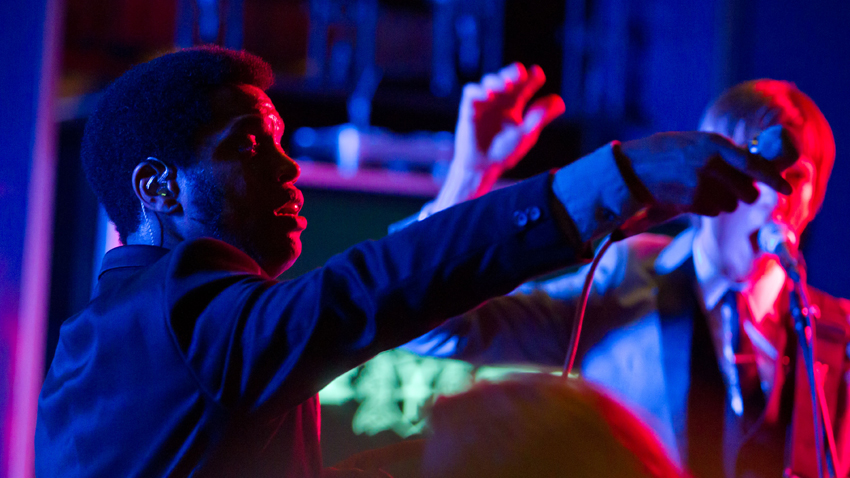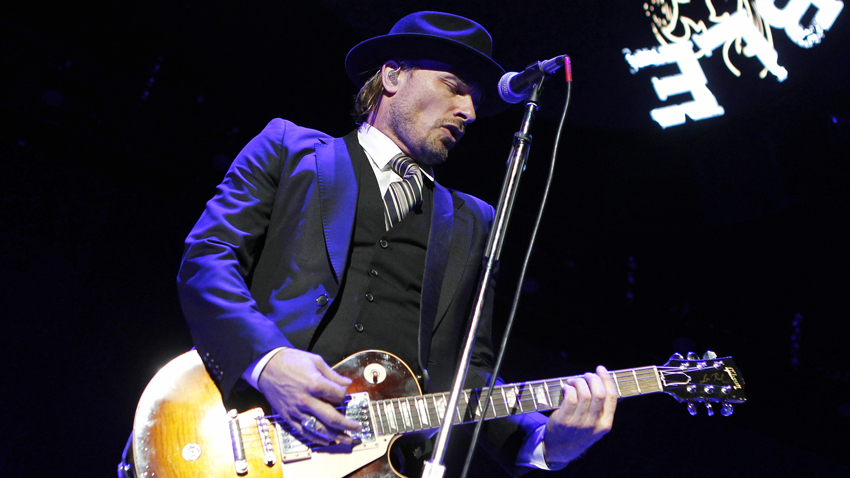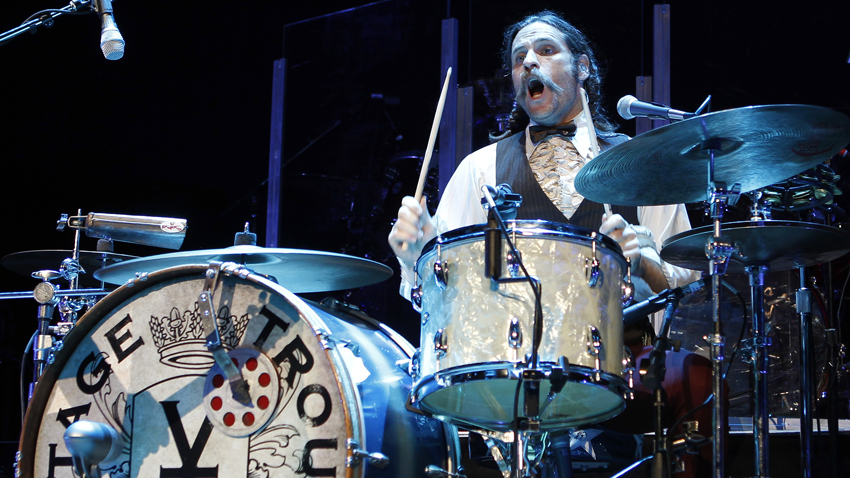Vintage Trouble is a band in demand. Their last 18 months is all the proof you need: over 200 shows on four continents, including support slots with The Who, Brian May and Bon Jovi, and a series of barnstorming TV performances.
To cap all that, this summer, they've been hand picked by The Rolling Stones to bring their retro-flavoured rock and soul to Hyde Park. We caught up with LA's hardest working band to talk breaking through and sharing stages with legends…
How did Vintage Trouble get started?
Ty Taylor (vox): "We've been together for three years. The first time we played, the first time Richard played a fill at the top of Blues Hand Me Down, we all just looked at each other and from that moment on knew that the chemistry was right. We'd never felt that in other groups. It just made us start playing all the time, and before long we picked up four residencies in LA. We were playing four nights a week original music and we weren't having to get our friends to come.
"From that point, we started understanding that we didn't want to do anything else. We were going to create our own path. I guess [legendary manager of Mötley Crüe and Bon Jovi] Doc McGhee heard about us, he came around and we decided we were gonna go to England. This is after we'd already been together for a year in LA - some people tend to forget that. So we came to England - we were basing it off of a 1967 thing when the Stax Volt tour brought a lot of rhythm and blues people over here.
"Before we got here, we had the fortune of having MusicWeek and HMV name us next best thing, so that's what got us on the Jools Holland show."
Nalle Colt (guitar): "We got really lucky on Jools Holland. We performed with KD Lang and Fleet Foxes, great bands but they were really mellow. We were all really nervous; we'd never been on TV as a band together. We played the song probably twice as fast as we normally play it because of adrenalin, but it really worked.
Want all the hottest music and gear news, reviews, deals, features and more, direct to your inbox? Sign up here.
"Their low energy and their songs were slow and beautiful, but when we came on it was this energy burst. It was incredible. We were supposed to tour here for three weeks with Brian May, and we ended up staying for four months. We toured the UK around six times that year.
"You can perform on a TV show in the States, and you get pretty decent feedback from it, you can see more people coming to the shows and stuff. But here, being on Jools Holland, it had an immediate impact. We were walking down the streets and people were cranking the CD in the car, it was unbelievable! We'd only been here for five days!"
Rick Barrio Dill (bass): "We have our own record label, so we were selling them out of the trunk of our car. That night, the website crashed and we were up all night getting calls from LA and from our manager's office telling us about all the calls they were getting. I don't think we went to bed until noon the next day.
TT: "For the next few days we had an assembly line and were packaging and writing addresses, mailing out CDs."
RBD: "At the Liverpool post office we had six huge Santa Claus bags of CDs and t-shirts we were sending off."
Richard Danielson (drums): "We have a documentary coming our that's a hundred day span that starts out from the Jools Holland show. A couple of days after the show we were playing very small bars and clubs down in Camden, and then a little bit of a bigger place, and then we got the Brian May tour which was a theatre tour.
"Then we got the Bon Jovi tour, which was stadiums, and in between we were still playing our own headlining shows, which were slowly graduating to larger venues. It was from Jools Holland to a hundred days later and it was from small clubs to arenas in that span.
"Something really unique happened. Within that 100 day span we basically took this idea that we had started in Los Angeles, which was the feeling of these residencies that we had - that's how our Troublemakers came about, our fans, which originated in LA - it was us throwing more of a party feel than a concert.
"People would want to show up again and again and a community would form, friendship would happen and people started following the band. When we came to the UK, the fact we were able to tour so many times over meant we were able to do that same thing. We treated the whole country like a residency. It's a small place so people were able to get to the show.
"We gathered the Troublemakers in the UK and they really lit some fire under the whole thing. We had one lady that came to 50 shows. We've stamped that out all over the world - we've got Troublemaker groups in Germany, in Japan, Australia, and then we have little sub-groups. In America we've got Chicago, Pittsburgh, and all these groups are talking to each other. It's really a dynamite community that follows us; it's a special thing."

Ty Taylor works the crowd (credit: RD/ Kabik/Retna Ltd./Corbis)
How did you find coming over to tour the UK after getting started in LA?
NC: "I'm from Sweden so I'm from this part of the world. We'd never been here as a band, but we always wanted to come here. There's something about the UK audience that they seem to be more willing to check out something new.
"In America you've got to convince them a little bit! There's more of an acceptance here, I think. You can present something new, and maybe because it's from America people get excited and want to check it out. Who knows? It's the same when English bands come to the States, it's extra special because it's English or British. We really wanted to try it, to go somewhere else to start the ship."
TT: "The only difference for us was the accents, but it made us be in the moment. When we came here we realised that we didn't have the same history with the people so it made us perform in a way that we didn't take anything for granted. We didn't know what the energy would be like when we came here, so we couldn't lean back.
You'd recorded your debut album, The Bomb Shelter Sessions, before you got the UK?
NC: "The album wasn't really meant to be an album. We started doing live shows pretty much right away, and we'd been playing at a blues bar in Santa Monica. We started playing and our audience started asking if we had any recordings. We were curious ourselves as to how would we sound - we'd never heard the songs.
"I have a friend who owns a recording studio, a really nice one, so I gave him a call and asked him it would be cool if we came down and set up our gear and played really quick. So we did, we went down and tracked it, all in the same room.
"When we went into the control room and listened to it we were nicely surprised. We pressed like 400 CDs or something and sold it at shows and didn't think much of it, but people really loved it and started copying it and suddenly we had all these people talking about our record. We're still touring that album, it's amazing."
TT: We made it for under a thousand dollars in two and a half days.
So it was pretty much a direct recording of the set you were playing live?
RDB: "We'd only been a band three weeks when we got our first residency, and we'd only been a band for three months when we made the record. Everything was brand new, and had an honesty to it."
NC: "When I listen to the record, I can hear that there's such a simplicity as we still didn't really know it that well, we were still trying things out. Some of the songs really have a beauty because of that, they're very sparse. Most bands now when they make records jam so much in there, but we kept it simple and it was really nice."

Nalle Colt brings the rock to the soul (credit: Corbis)
As a band you've got an old school look, and the sound is deeply rooted in soul and rock and roll from the fifties and sixties - was that natural, or something you consciously decided to do?
NC: "It's a little bit of both I think. We figured out fairly quick that there was something with the rawness or keeping it simple that really worked."
RD: "From a drum perspective, I was trying to lay things down really simple, but in trying to keep it simple there are a lot of complexities in there. It's constructed to sound and feel a certain way."
TT: "Anything that's more exposed has to have more depth really, as you're going to hear it more. When you've just got a few tracks of open, simple music then you've got to have dynamics. There's nothing to hide behind."
It's takes a smart musician to service the song though - sometimes it's the hardest thing to do.
TT: "We were playing it all the way through and not recording to a click, so you have to know the piece and when you're done, hopefully you're not the one who messed up the take! You all want to zone in together."
NC: "I think it came out of experience too. We've all been in a lot of bands before, and we all made the mistake of doing all that before.
"At the time when we met, we were listening to a lot of similar music like Ike and Tina Turner, Chuck Berry, Little Richard, Bo Diddley, all that kind of stuff."
TT: "We spent a lot of hours rehearsing. We would have eight hour rehearsals a lot of times."
NC: "Because we've all been in so many bands, when we met up we were always saying that if we're going to do this, we've got to do it. You've got to drop pretty much your whole life around you and just do this. We were a little bit at the end of the road, a lot of us.
"We'd been working musicians and stuff. Sometimes when you're a session musician or you work for some artist, you've got to do whatever. Now having the liberty of doing our own thing, you've just got to hit it really hard and work around the clock.
"We own our own record label, we own our own merchandise company, we do everything on our own and we're proud of it, but it's a lot of work. It's been paying off. We have a great company - it's more than a band now, and it's awesome. In the future, we're even looking at other artists to expand our label."

Richard Danielson and his fine moustache (credit: Corbis)
That seems to be what it takes to be a success now - bands need to be businessmen, online experts, marketing gurus and entertainers. Do you all have set roles within the Vintage Trouble business set up?
NC: "Yeah, totally. We met Billy Squier at a Who show, and I was telling him what we were doing, and he was saying that he was so glad that he was a rock star in the '70s as he could never deal with the shit we're dealing with! But we're always working, there's always something to do."
RD: "We're in a constant state of work. Everyone has their role. We do all of our own social networking, all our own graphics, everything we do is in-house pretty much.
NC: "That's what bands have got to do now. Forget the era of selling millions of albums and being a rock star with your own private airliner. We're gonna get there one day by hard work, hopefully, but selling that kind of quantity of albums is gone. Now it's more about live tours and everything around it."
Having complete control must make the successes all the more satisfying?
RD: "It's funny, we do work extremely hard every day at everything, but the one thing that's never felt like work is the music. It all came together so quick and so organically. It was all going so fast, there was no effort or work involved. That's how we were able to record a record after having been together for three months."
RBD: "It's 27 months since we did the Jools Holland show, and there are still no off days. Even when we're not playing, we're recording a video or in pre-production for recording. We're always working."
NC: "It's still about luck too, being in the right place and the right time. We're willing to work, so we had moments where we found ourselves in the right place at the right time. Especially this year and last year, playing with The Who, Booker T Jones, The Stones, Lenny Kravitz, Bon Jovi, Brian May, Bootsy Collins - all this stuff has happened in such a short space of time. You've got to keep going, and you've got to get yourself out there as a band. The whole trying to be the mystery rock star thing, it seems a little far gone."
So how do you prepare for supporting the Stones? Does the show change at all?
TT: "I would say that the difference is like having a conversation. I can't say the same thing whoever I'm talking to, the difference is the communication. You're going to communicate to someone who's five feet in front of you as opposed to five thousand feet in front of you. It's even different from club to club, not just club to stadium. You've got to play to the moment."
NC: "We try to balance it out too all the time. With the last tour with The Who in America, we'd always book shows the same night in small clubs after, so we'd be in this huge arena with big sound and people screaming, then run off to a little honky-tonk bar above a bowling alley, with some drunk guy hanging over you. I love them both, there's something so trashy and naughty about playing in a shitty club, and then of course to get energy of an arena, to hear that roar, that's something you get addicted to."
RD: "I think that's why this band has excelled so quickly early on. A lot of bands wait months before they play their next show, and they plan out these big shows. For us, we were playing four nights a week at one point.
"We got discovered with Ty singing out of a tiny guitar amp, that's how stripped down we were at that show. We were playing everywhere from full band shows to acoustic shows. It's probably how we can adjust to rooms so easily, because we've been in so many scenarios.
"There's times where I've picked up knives and cups and played grooves to the guitar because, I guess we've got a gig in this room right now! I think it's important for bands to try to spit their music out in different ways. If you're a really hard rock band, try and play acoustic - mix it up, you'll discover all kinds of different voices within your music."
How does it feel to hear you're going to be supporting The Rolling Stones?
NC: "We were filming the Jay Leno show, and our manager came in and told us and it was amazing. We're on tour with The Who now. We were here last year sitting in some bar, and we were joking around saying that next year we'll play with the fricking stones, and here we are actually doing it!"
TT: "It's empowering too, because there's no way they're going to put someone before them they don't want to be there. It makes you feel validated, and like you want to be better, and proud of what you've put together.
"It's been such a lesson in what you put in, you get out. It was already big enough that we were on the Tonight Show that day, and then to have that performance and the moment be trumped by news of anything, what could that news be? That you're supporting the Stones, that's the only thing it could be!"
Vintage Trouble is currently on tour with The Who as well as headlining the following dates:
9 June Whelans, Dublin £12 tickets available from Ticketmaster
13 June ABC, Glasgow £16 tickets available from SeeTickets
17 June The Electric Brixton, London £17.50 tickets available from Ticketmaster
20 June Northumbria University (late show) £12 tickets available from SeeTickets
22 June Fibbers, York £14 tickets available from SeeTickets
24 June Trinity, Bristol £12 tickets available from SeeTickets
26 June Glee Club, Cardiff £13 tickets available from SeeTickets
29 June Avalon Stage, Glastonbury, UK
13 July Hyde Park, London, main stage supporting the Rolling Stones
Debut album The Bomb Shelter Sessions (Encore Edition) is available from iTunes now, as is latest single Pelvis Pusher.
For more information, visit the official Vintage Trouble website, or connect with the band on Facebook or Twitter.